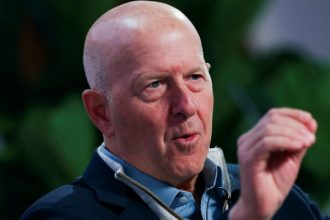With the eyes of the country on Hurricane Idalia as it spins toward Florida’s Gulf Coast, Florida Gov. Ron DeSantis’ presidential ambitions are also under the spotlight as he puts his campaign on hold to manage the crisis at home.
DeSantis flew back to Tallahassee from Iowa on Saturday night and has since appeared regularly on Florida televisions with updates on Idalia’s path and state efforts to prepare for the approaching storm. From behind a lectern with the state seal, the Republican governor has matter-of-factly shared logistics and warnings.
The coming days will present a range of tests for DeSantis to navigate during a critical juncture in his governorship and White House bid. His stewardship of the hurricane response and recovery efforts will be closely scrutinized by his political opponents and Republican voters, watching whether he can lead through difficult moments, comfort the aggrieved and learn from the lessons of past storms.
It is not clear when DeSantis will return to the campaign trail. In a text message to supporters, his campaign said it would go dark for a few days, adding: “Before we sign off, can we ask you to chip in any amount you can to support our end-of-month fundraising push?”
For his part, DeSantis said he will be in Florida for as long as necessary.
“You do what you need to do,” DeSantis said Tuesday. “So that’s what we’re doing. It’s going to be no different than what we did during Hurricane Ian [last year]. I’m hoping that this storm is not as catastrophic as Hurricane Ian was, but we’re gonna do what we need to do because it’s just something that’s important.”
While no Florida executive would publicly suggest a hurricane is an opportunity to showcase leadership chops, past storms have certainly tested governors and forged their legacies. DeSantis’ predecessor, Republican Rick Scott, dealt with Hurricane Michael just weeks before the 2018 election, when he was running for US Senate against incumbent Democrat Bill Nelson. Scott leaned into managing the crisis with gusto and ultimately won his race in a recount.
Perhaps no one did more to solidify their standing among Floridians during such disasters as former GOP Gov. Jeb Bush, whose handling of eight hurricanes during a deadly two-year stretch of tropical weather is still remembered by those who experienced the devastation. One of those hurricanes, Katrina, forever altered perceptions of the presidency of Bush’s older brother, George W. Bush, showcasing how storms can also plunge an executive into crisis.
Those past Florida governors, though, were not running for president. Rarely have incumbent state executives faced a disaster of Idalia’s potential magnitude in the throes of a White House bid.
The most notable recent exception is Republican Chris Christie, who as New Jersey governor in 2016 returned to his home state to manage a blizzard amid criticism for putting the presidential race ahead of his elected duties. At the time, Christie was campaigning in New Hampshire, which was just weeks away from holding the first-in-the-nation primary. Christie is once again running for the GOP nomination.
“I don’t think any presidential candidate wants to be taken off the campaign trail. But you can’t ignore your day job,” said Alex Conant, a senior adviser to Florida Sen. Marco Rubio’s 2016 presidential campaign. “Insufficient responses to storms have ended political careers. Every governor takes the threat of a hurricane seriously because if the response is mishandled, not only are lives at stake, but there’s political fallout.”
In the past 24 hours, DeSantis’ team has signaled it would not shy away from showcasing the governor’s storm response to Republican voters. His aides have shared posts on social media of people praising DeSantis’ activity so far, with his office press secretary writing on X, “Find you a leader that shows up like @GovRonDeSantis.” In a memo sent Tuesday, DeSantis spokesman Andrew Romeo wrote that DeSantis is “now at the helm of Florida’s hurricane response and is working with local officials across the state to do everything necessary to ensure Florida is fully prepared.”
“This is the strong leadership in times of crisis that Americans can expect from a President DeSantis,” Romeo added.
Just as he did last year, when Hurricane Ian slammed into Florida amid his race for reelection, DeSantis has vowed to put partisan politics aside for the time being. Though a regular critic of President Joe Biden – including over the Democrat’s response to the Maui wildfires – DeSantis said he has spoken with the president and expects the two administrations to work in concert toward Florida’s recovery.
“There’s time and a place to have political season, but then there’s a time and a place to say that this is something that’s life-threatening. This is something that could potentially cost somebody their life, it could cost them their livelihood, and we have responsibility as Americans to come together,” DeSantis said Monday.
(Coming off the devastation in Hawaii, Biden is facing a separate range of questions about his administration’s response to yet another natural catastrophe.)
DeSantis’ departure from the campaign trail comes just days after the first GOP presidential debate at a moment when his team believes voters are starting to tune into the race. He is trailing Donald Trump in GOP primary polling but is aggressively challenging the former president in early nominating states.
The Florida governor is also staving off a field of GOP contenders, who must now also balance sensitivities around Hurricane Idalia with their attempts to overcome DeSantis in the polls.
“DeSantis is going to get a breather in terms of attacks,” said Todd Belt, director of the political management program at George Washington University and author of “The Post-Heroic Presidency.”
“This is similar to what we see in the rally-around-the-flag phenomena,” Belt said. “When there’s something that affects the country more generally, the other party ceases attacks on the incumbent party. It helps in the polls, at least temporarily. It would look really bad for other Republicans to criticize DeSantis during this time, and the question is how long will they wait? It’s worth noting that Florida is an extremely important electoral state.”
Storm response has already become part of DeSantis’ pitch to voters. On the campaign trail, he has often shared the story of the swift reopening of two bridges destroyed by Hurricane Ian as evidence of his executive management. DeSantis has also asserted that he could send his “Florida people” to the southern border to build a wall.
“Come on, Joe (Biden),” he said earlier this year. “Let us get it done. We’ll do it.”
But Ian also generated some negative attention for DeSantis. Images of the governor wearing white rain boots and campaign gear as he surveyed storm-ravaged regions provided fodder for his political detractors and were spread widely on social media by Democrats and Trump supporters.
DeSantis was also forced to defend the late local evacuation orders last year that left many coastal residents in Lee County unprepared for Ian’s deadly turn, despite the persistent threat of cataclysmic storm surge.
Though DeSantis said this week that the state has not changed its evacuation protocols, he and state officials have emphasized that Idalia could bring dangerous storm surge all along Florida’s west coast, even outside the projected path of the storm. This year, he has spent time warning residents who are outside the forecasted “cone” – or the probable track of the center of the storm.
Idalia is forecast to make landfall near Florida’s Big Bend area as a Category 3 hurricane or stronger, potentially bringing record storm surge to a part of the state’s west coast that has not experienced a storm of this magnitude in more than 150 years.
While the storm is perhaps an opportunity for DeSantis to show strength in mobilizing his administration to respond to a storm, the expected devastation also has the potential to challenge DeSantis’ limitations as a consoler in chief, a role Biden has embraced during national tragedies.
DeSantis’ capacity for compassion has already come under fire this week following his rushed response to Saturday’s killing of three Black people by a White gunman in Jacksonville. His office on Saturday shared a video statement from DeSantis that seemed hastily shot in front of white vinyl siding in Iowa, during which he called the racially targeted attack “totally unacceptable.” The next day he attended a vigil for the victims where he called the shooter a “major league scumbag.”
The tone of his remarks and his appearance at the vigil drew criticism from those who wanted DeSantis to acknowledge efforts by his administration to alter how Florida students learn about race and the lived experience of Black Americans.
“A white man in his early twenties specifically went to kill BLACK PEOPLE,” Democratic state Rep. Angie Nixon, who represents Jacksonville and was photographed next to DeSantis at the vigil wearing a “Stand with Black Women” shirt, posted on X. “The governor of our state of Florida has created an environment ripe for this.”
Read the full article here





